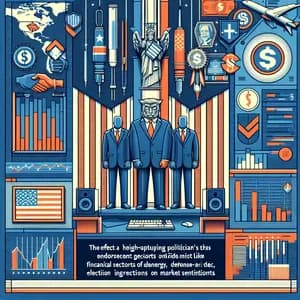Tariff Turbulence: How Trade Tensions Boost Wall Street Trading Revenue

Title: The Impact of Tariff Uncertainty on Wall Street Trading Revenue
As stock investors navigate the complex landscape of financial markets, one prominent theme has emerged: the influence of tariff uncertainty on trading revenue. Recent reports indicate that major financial institutions, including Goldman Sachs ($GS), have benefited significantly from the volatility brought about by trade tensions. This article explores how tariffs are shaping market dynamics and highlights some companies that are notably affected.
Goldman Sachs, a powerhouse in investment banking and trading, reported a surge in trading revenue as uncertainty surrounding tariffs prompted increased market activity. The bank's first-quarter earnings showcased how traders capitalized on the fluctuations in stock prices and commodities driven by tariff announcements and negotiations. This trend is not isolated to Goldman Sachs; other financial institutions are likely experiencing similar boosts as investors actively seek to navigate the changing landscape.
For stock investors, the implications of tariff-related volatility extend beyond financial institutions. Companies in various sectors are feeling the pinch or reaping the benefits of trade policies. For instance, tech giants like Apple ($AAPL) have seen their stocks react sharply to tariff announcements. Recent developments, such as the Trump administration's exemption of certain tech products from tariffs, have provided a temporary reprieve for Apple and its suppliers, including Taiwan Semiconductor Manufacturing Company ($TSM) and Qualcomm ($QCOM). These companies are critical players in the semiconductor and electronics industries, which have been at the forefront of tariff discussions.
Moreover, the energy sector, particularly oil companies like Exxon Mobil ($XOM), is also feeling the effects of tariff uncertainty. Fluctuations in oil prices often correlate with trade tensions, as the global economic outlook can influence demand and pricing strategies. As investors keep a close eye on these developments, companies like Exxon Mobil must navigate the challenges posed by both tariffs and market sentiments.
In summary, as stock investors assess their portfolios amid the backdrop of tariff uncertainty, the ripple effects on trading revenue and company performance are becoming increasingly evident. Staying informed about how these dynamics play out will be crucial for making strategic investment decisions.
For further insights into the impact of tariff uncertainty on Wall Street's trading revenues, check out the following articles:
- Read more: Goldman Sachs Earnings and Tariff Uncertainty
- Read more: Tech Stocks and Tariff Reprieves




